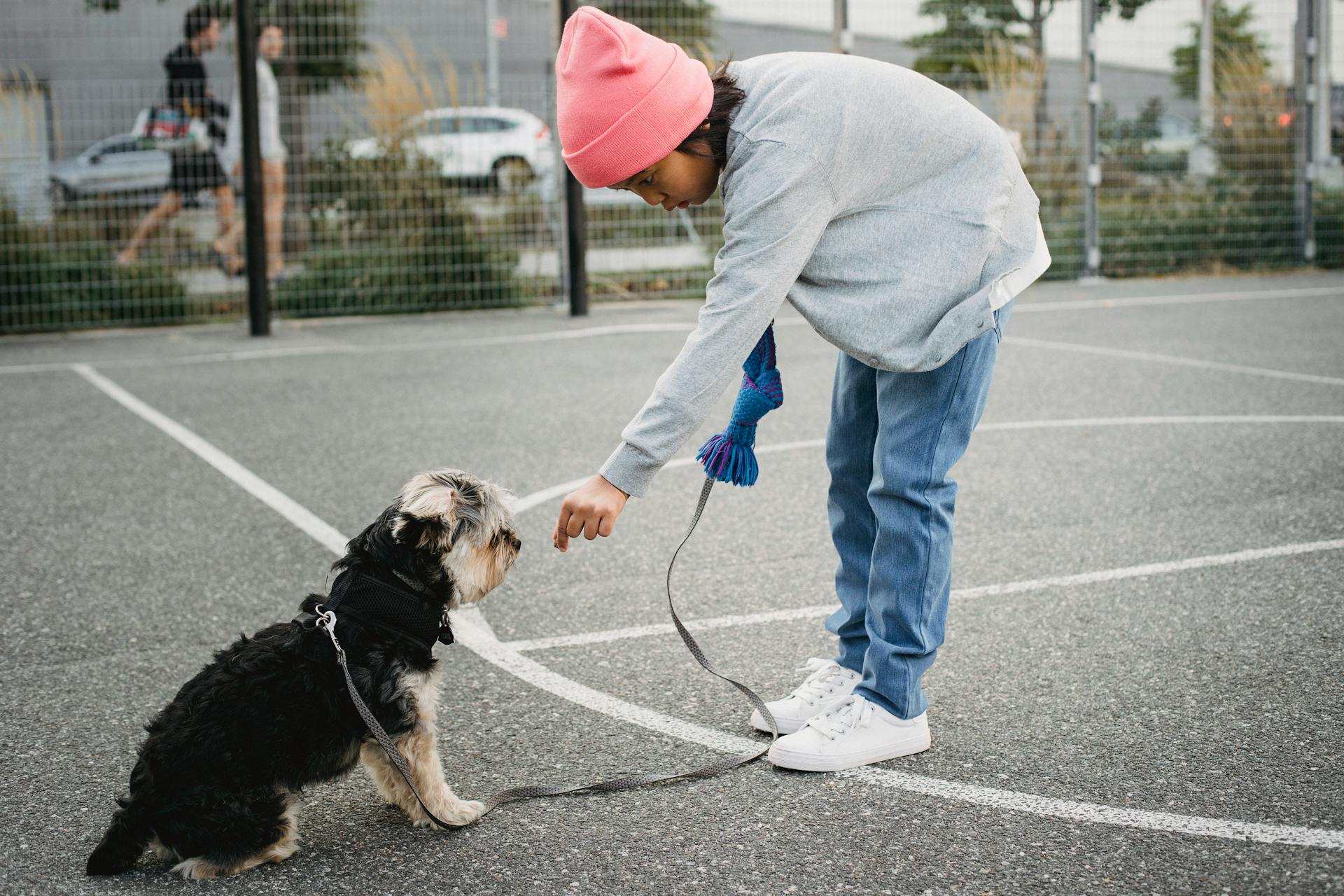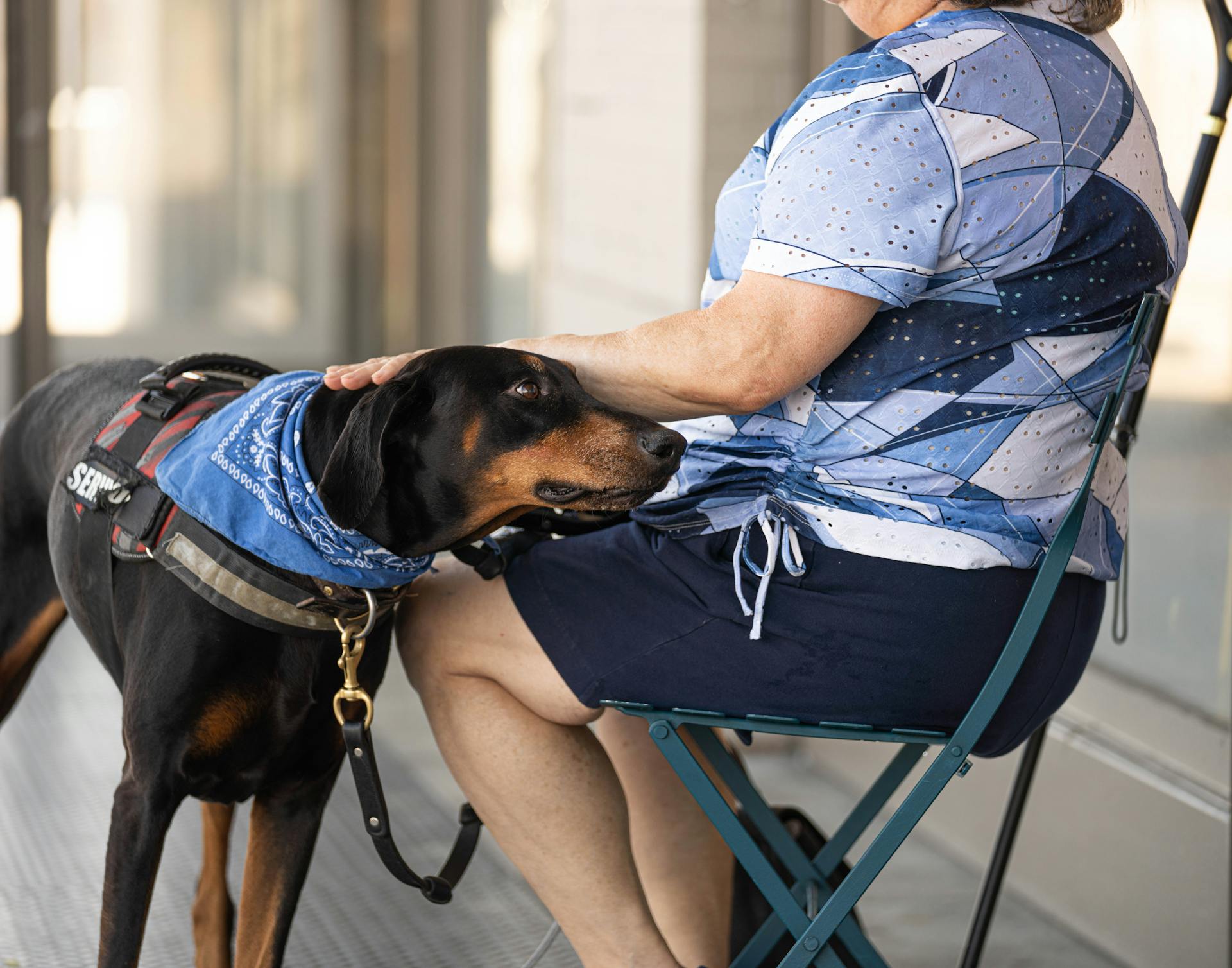
Service dogs in schools can make a huge difference in a student's life. By providing emotional support and assistance, these dogs can help students feel more confident and secure.
Studies have shown that students with service dogs have better attendance and higher grades. In fact, one study found that students with service dogs were 25% more likely to attend school regularly.
Having a service dog in the classroom can also help students with anxiety and stress. These dogs can provide a calming presence and help students feel more comfortable in a new environment.
For example, a student with a service dog may feel more confident participating in class discussions or taking tests. With their dog by their side, they may feel more at ease and be able to focus on their schoolwork.
If this caught your attention, see: Financial Help for Service Dogs
What Are Service Dogs?
Service dogs are a medical tool, trained to help their owners overcome the hardships of their disability. They are not pets, but rather a vital part of a person's daily life.
According to the Americans with Disabilities Act (ADA), a service dog is trained to take on a task for a person with a disability. This task has to be related directly to the person's disability.
Service dogs can detect impending seizures in people with epilepsy, or identify low blood sugar in diabetic patients. These tasks are essential for safety and daily life.
Service Dogs in Schools
Service dogs are allowed in schools for students with disabilities, thanks to federal laws like Title II of the Americans with Disabilities Act (ADA) and Section 504 of the Rehabilitation Act.
These laws require public schools to provide equal access to education for students with disabilities, including the use of service dogs. Service dogs are not just a tool for students, but also a part of their education process.
Students with service dogs cannot be penalized or treated unfairly, and schools must make accommodations to ensure their access to education.
Readers also liked: What Is the Law for Service Dogs in Florida
The care and grooming of service dogs should be determined beforehand, especially for small children, to ensure a smooth transition.
Here are the two federal laws that apply directly to service dogs' presence in public schools:
- Title II of the Americans with Disabilities Act (ADA)
- Section 504 of the Rehabilitation Act
These laws prohibit discrimination against students with disabilities and require schools to provide equal access to education, including the use of service dogs.
Benefits and Challenges
Service Dogs in schools offer numerous benefits to students with disabilities. They can help children with autism improve their social skills and communication abilities.
Working with a Service Dog can stimulate students' cognitive and motor skills development. This is documented in a study by the National Institutes of Health (NIH).
Service Dogs provide emotional support and companionship, which can significantly reduce feelings of anxiety and depression.
School Benefits
Service Dogs can be incredibly beneficial for students with disabilities in schools.
A study by the National Institutes of Health found that working with a Service Dog can stimulate students' cognitive and motor skills development.

Having a Service Dog in the classroom can help students with disabilities perform daily tasks they may otherwise struggle with, boosting their self-confidence and reliance.
This can allow for more autonomy in their school day and an increased sense of accomplishment.
Service Dogs provide emotional support and companionship, which can significantly reduce feelings of anxiety and depression.
Many teachers find that a Service Dog can be helpful in a special-education classroom of low-functioning students, improving students' attitudes toward school and facilitating learning lessons in responsibility, respect, and empathy.
In fact, teachers of special education classrooms often report that the whole class is easier to manage when a Service Dog is present, and they may even ask for the dog to be brought in more often.
If this caught your attention, see: Can Teachers Have Service Dogs
Challenges of Schools
Integrating Service Dogs into schools can be a complex issue. Schools must balance the needs of all students and staff when considering the inclusion of Service Dogs.

Students or staff with dog allergies or cynophobia may be adversely affected by the presence of a Service Dog. This is a legitimate concern that schools need to address.
Service Dogs can cause distraction or disruption in a classroom setting, even though they're trained to behave appropriately in public. Schools can mitigate these issues by providing training for the school community.
Schools must ensure their facilities are accessible and safe for Service Dogs. This includes providing water sources and suitable areas for rest.
To achieve this, schools can take a few simple steps. They can designate areas for Service Dogs to rest and provide water sources in these areas.
Americans with Disabilities Act (ADA)
The Americans with Disabilities Act (ADA) plays a crucial role in ensuring that students with service dogs have equal access to education. Under the ADA, schools are required to modify their policies to permit the use of a Service Dog by a student with a disability.
Take a look at this: Are Psychiatric Service Dogs Covered under the Ada
The ADA is not the only federal law that applies to service dogs in schools. Section 504 of the Rehabilitation Act also prohibits schools that receive federal funding from discriminating against students with disabilities, including the use of Service Dogs.
If a Service Dog is necessary for a child to receive a Free Appropriate Public Education (FAPE), it should be allowed in school, as mandated by the Individuals with Disabilities Education Act (IDEA).
The ADA asks a simple yet important question: Does the dog help a person who has disabilities with their activities of daily living? In other words, does this person need the dog to help them get through their day in a significant way?
Here's a quick rundown of the relevant laws and policies:
- Americans with Disabilities Act (ADA)
- Section 504 of the Rehabilitation Act
- Individuals with Disabilities Education Act (IDEA)
Education and Training
Service dogs can greatly benefit students with disabilities by providing emotional support and assistance with daily tasks.
In the US, the Americans with Disabilities Act (ADA) requires schools to allow service dogs in the classroom, but they must be properly trained and certified.
Service dogs can be trained to perform a variety of tasks, such as opening doors, picking up items, and providing physical support.
Suggestion: Emotional Support Dogs vs Service Dogs
Collaboration Between Schools and Parents
Service Dogs can be a game-changer for students with disabilities, but they require a collaborative effort between schools and parents.
Service Dogs are trained to assist people with disabilities, and working with one can stimulate students' cognitive and motor skills development, as documented in a study by the National Institutes of Health (NIH).
For a Service Dog to be effective in a school setting, parents and educators need to be on the same page. This includes understanding the specific needs of the student and how the Service Dog can support them.
Service Dogs can help students with disabilities perform daily tasks they may otherwise struggle with, boosting their self-confidence and reliance.
By working together, schools and parents can create a more inclusive and comfortable learning environment for students with Service Dogs.
Suggestion: Law on Service Dogs
Second Year
The second year of a child's education can be a game-changer, especially for those with special needs. The one-on-one assistant played a crucial role in helping the child's social interactions.

This child, who had trouble hearing and understanding his peers the year before, was now becoming popular due to his service dog serving as a social bridge. His classmates loved the dog, and therefore, the boy with the dog.
One classmate even expressed her admiration by saying, "Oh, I wish I could be this boy's sister!" This shows how the service dog helped to break down barriers and build connections between the child and his peers.
Students and Service Dogs
Having a service dog in school can be a game-changer for students with disabilities. A service dog offers a person with a disability the freedom to participate in the world around them.
Service dogs are not pets, but an extension of a youth's mastery over their disability, allowing them to foster their independence and achieve their goals more fully. This is especially important for students who rely on their service dogs to navigate their daily lives.
Federal laws recognize the need for students with disabilities to have full access to their rights, including the use of their service dogs, in a supportive environment. Allowing the full use of their rights enables students to empower and educate themselves.
Learning to live with their disability requires a service dog's assistance, and learning to live with their disability is part of why they are in school. Schools must abide by federal laws that recognize this need for the benefit of all.
By having a service dog in school, students with disabilities can grow into productive adults through a well-rounded education and life experience.
Expand your knowledge: Laws about Service Dogs in Training
Success Stories
Service dogs have been making a huge impact in schools, helping students with various needs.
Students with autism have seen significant improvements in their social interactions and emotional regulation thanks to the presence of a service dog.
A service dog named Max helped a 7-year-old boy with autism transition to a regular classroom from a special needs program.
Recommended read: Tasks for Autism Service Dogs
In some schools, service dogs are being used to provide emotional support to students who have experienced trauma.
One student, Emma, credits her service dog with helping her feel more confident and secure in the classroom.
Service dogs are trained to respond to over 100 different commands, and they're also able to detect changes in their handler's emotional state.
By having a service dog in the classroom, teachers are able to create a more inclusive and supportive environment for all students.
Intriguing read: Emotional Service Dogs
Frequently Asked Questions
What is the law for service dogs in Florida?
In Florida, service dogs are protected by state and federal laws, requiring public accommodations and commercial facilities to allow them in most areas. Under these laws, service dogs have access to government offices, schools, restaurants, hotels, and more.
Sources
- https://www.abilities.com/community/service-dogs-in-school.html
- https://www.ecad1.org/index.php/resources/blog/213-service-dogs-in-schools-benefits-challenges-and-policies
- https://www.disabilityrightsohio.org/faq-special-education-service-dogs
- https://www.servicedogcertifications.org/can-a-service-dog-be-taken-to-school/
- https://www.pawsitivityservicedogs.com/school
Featured Images: pexels.com


